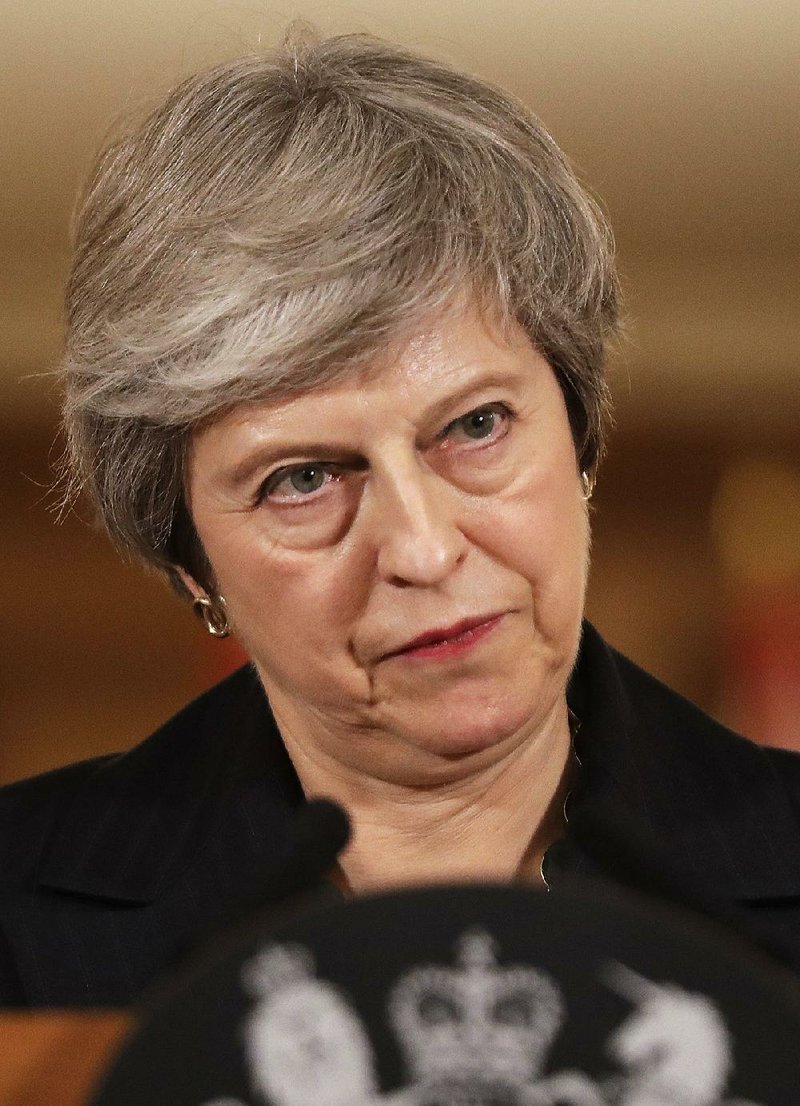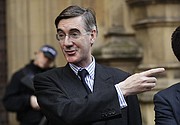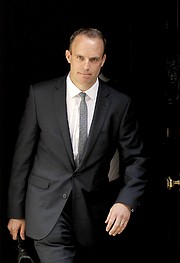LONDON -- Prime Minister Theresa May of Britain faced a deep political crisis on Thursday after two Cabinet ministers quit her government, including Dominic Raab, her chief negotiator on withdrawal from the European Union -- decisions that threaten to wreck not only her plans for the exit but also her leadership.
The surprise resignation of Raab on Thursday morning followed a tense, five-hour meeting of the Cabinet the previous day, during which ministers reluctantly agreed to sign off on May's draft plans for departure from the European Union.
Raab's departure was not only unexpected but also deeply damaging to May's authority, increasing the risk that she might face a leadership challenge from rebel lawmakers inside her own Conservative Party.
Shortly after Raab's announcement, Esther McVey, the work and pensions secretary, resigned, adding to the turmoil.
At a news conference at the end of the day, May insisted that she was not worried about the prospects for the deal or her own political fortunes.
"Leadership is about [making] the right decisions, not the easy ones," she said. "Am I going to see this through? Yes."
The pound, an indicator of stability amid the debate, fell sharply on the news that Raab had resigned and dropped again when the pensions minister stepped down. The currency, which was worth close to $1.30 before Raab's resignation, dipped to $1.27 by midmorning and continued to have an unsteady day.
The crisis is a grave one for May, who knew even before the resignations that she would struggle to win parliamentary approval for her draft agreement. She addressed the House of Commons on Thursday morning to sell her deal and for nearly three hours took questions on the deal, nearly all of them ranging from skeptical to outright hostile.
"What we agreed yesterday was not the final deal," she said. "It is a draft treaty that means that we will leave the EU in a smooth and orderly way on the 29th of March, 2019, and which sets the framework for a future relationship that delivers in our national interest."
She added that the deal "delivers in ways that many said could simply not be done." It would put in place a transitional relationship with the European Union through the end of 2020, while a permanent arrangement is negotiated, but the transition period could be extended.
Jeremy Corbyn, the Labor Party leader, called May's agreement "a leap in the dark, an ill-defined deal by a never-defined date." The continued uncertainty about Britain's relationship with Europe, lasting at least another two years and possibly much longer, will accelerate the exodus of businesses and investment that is already underway, he said.
"Parliament cannot, and I believe will not," accept the arrangement, he added.
That view was echoed by Ian Blackford, a lawmaker from the Scottish National Party, who said the prime minister was "trying to sell us a deal that is already dead in the water."
Reflecting the cool response to May's plan and the talk of a leadership challenge, Laura Kuenssberg, the political editor of the BBC, asked at the prime minister's news conference, "Is it not the case now that you are in office, but you're not really in power?" May did not answer directly, sticking firmly to her talking points about the deal and declining to dwell on the politics around it.
The lack of support for the agreement from lawmakers in both major parties had kept the pound down. "What we need to see is ministers who have not resigned come out and back the deal," said Jordan Rochester, a foreign exchange strategist at Nomura Securities. "It's not the PR campaign we've expected."
Still, the lack of clarity kept the pound from collapsing, Rochester said, though calls for a vote of no confidence in May did not help. Despite a series of negative headlines through the day, he noted, the pound did not continue to fall.
"There is a buyer out there," he said. "It's guys thinking, 'It's bad now, but it increases the chance of remain.'"
Business groups have warned that if there is no deal by next month, companies will have to enact contingency plans that could include cutting jobs, stockpiling goods, and relocating production overseas.
May and her supporters say the alternatives to her deal -- leaving the bloc without a deal or a second vote on withdrawal -- are not realistic options.
If the agreement was abandoned, "nobody can know for sure the consequences that will follow," May said. "It would be to take a path of deep and grave uncertainty when the British people just want us to get on with it."
Speaking on the condition of anonymity, European Union officials on Thursday said the union had gone a long way to satisfy the prime minister's demands that there be no hard border between Ireland and Northern Ireland, and that Britain continue to have frictionless trade with the bloc.
Negotiators "think it is the best we can do collectively with the constraints that we have on both sides," one official said.
May made much the same point: "Nobody has any alternative proposal that both delivers on the referendum and ensures there is no hard border between Northern Ireland and Ireland."
RAAB'S DEPARTURE
Although a hard-line supporter of leaving the EU, Raab had been a core member of the Cabinet, and his presence had reassured other hard-line lawmakers. He served as chief negotiator for barely four months, succeeding David Davis, who also resigned, because he felt that May was not taking a hard enough line in negotiations.
In his letter of resignation, Raab said that he could not "reconcile the terms of the proposed deal with the promises we made."
McVey's departure, though damaging, was less of a surprise.
Another Cabinet minister, Penny Mordaunt, the international development secretary, was also reportedly reconsidering her position after a Cabinet debate on Wednesday that May described as "impassioned." As many as 10 Cabinet ministers were reported to have voiced reservations.
Iain Duncan Smith, a leading Conservative supporter of leaving the EU and former party leader, told the BBC that the effect of Raab's resignation would be "devastating," because it suggested that Raab's concerns had been ignored, despite his pivotal position in government and in withdrawal negotiations.
Meanwhile, leading anti-EU lawmaker Jacob Rees-Mogg called for a vote of no-confidence in May.
Rees-Mogg said May's deal "is not Brexit" because it would keep Britain in a customs union with the EU, potentially for an indefinite period. He said May was "losing the confidence of Conservative members of Parliament."
Rees-Mogg called for May to be replaced by a more firmly anti-EU politician, naming former Foreign Secretary Boris Johnson, Davis and Raab as potential successors.
Under Conservative rules, a confidence vote in the leader is triggered if 15 percent of Conservative lawmakers -- currently 48 -- write a letter to the party's 1922 Committee of backbenchers, which oversees leadership votes.
Only committee chairman Graham Brady knows for sure how many missives have been sent, but Rees-Mogg's letter is likely to spur others to do the same.
If a confidence vote is held and May loses, it would trigger a party leadership contest in which any Conservative lawmaker -- except her -- could run.
The turmoil is the latest flare-up in the Conservative Party's long-running dispute over Europe. Ever since Britain joined what was then the European Economic Community in 1973, the party has been split between supporters and opponents of Britain's membership. In 2016, then-Prime Minister David Cameron called a referendum "to settle this European question in British politics" once and for all.
He was confident the country would vote to remain, but voters opted by 52 percent to 48 percent to quit the EU, a result that left both the Conservatives and the country more divided than ever. Cameron's successor, May, has been struggling ever since to deliver a deal that satisfies those who want to leave, reconciles those wanting to remain and doesn't rock the economy -- a near-impossible balancing act.
In Brussels, where some EU officials hold out hope that Britain will change its mind about leaving, officials watched the political upheaval with interest.
EU chief Donald Tusk said it was "not for me to comment on the latest developments in London."
"All I can say is that the EU is prepared for a final deal with the U.K. in November," he said. "We are also prepared for a no deal scenario -- but of course we are best prepared for a no-Brexit scenario."
Information for this article was contributed by Stephen Castle of The New York Times; and by Jill Lawless, Raf Casert, Raphael Satter and Pan Pylas of The Associated Press.
A Section on 11/16/2018



